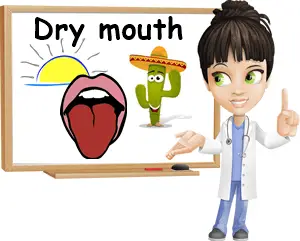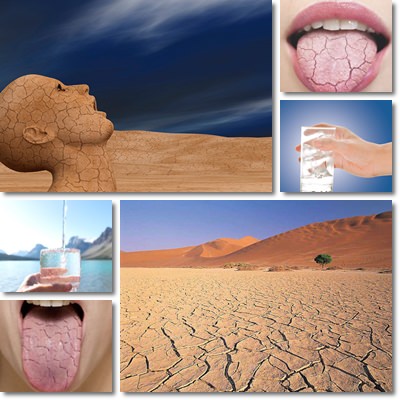Dry mouth is a common occurrence in young people as well as in the elderly. It’s one of those things many of us experience often but don’t pay much attention to because we don’t consider it a medical emergency.
However, dry mouth syndrome, but also the symptom of dry mouth can be hazardous experiences because having a dry mouth often implies difficulties swallowing food, beverages or medicine, but also poses a choking risk.
For people dealing with medical conditions such as laryngospasms or asthma, dry mouth can pose further problems and breed anxiety and fear.
Dry mouth is also known as xerostomia and refers to dry mouth as a symptom and dry mouth syndrome. The majority of reported dry mouth cases occur as a symptom, the most common factors causing it being medication, dehydration or poor dietary and lifestyle habits and are generally easily reversible. Dry mouth syndrome on the other hand results from reduced saliva production and possible salivary gland dysfunction.

Whether it occurs as a mere symptom, without any physical cause to account for it, or as a syndrome, dry mouth can, in time, compromise oral health.
From bad breath (halitosis) to tooth decay and dental cavities, increased susceptibility to infections at the level of the mouth, gum disease and bad taste in the mouth, dry mouth can engender more health problems than we can possibly imagine.
As mentioned above, dry mouth can be a symptom and a syndrome, and other more or less telling signs accompanying it are often present as well.
Signs and symptoms Of Dry Mouth
1) Dry mouth. The lack of saliva to moisten the mouth, the difficulties swallowing as well a feeling everything in the mouth, teeth, tongue, inside of the cheeks, are all crammed together make up the principal symptom: the dry mouth sensation.
2) Thick saliva. When there is little saliva production, the mouth becomes sticky and the saliva in it assumes a certain viscosity.
3) Burning sensation in the mouth. Many people suffering from dry mouth for a long time report feeling the inside of their cheeks or their tongue burning.
4) Difficulty swallowing. It has been shown that many people who suffer from dry mouth are not aware of it. However, experiencing difficulty when swallowing food, medication etc. or a feeling of suffocation, particularly in the morning, upon waking up can indicate dry mouth.
5) Difficulty speaking. When there is little saliva, the mouth is dry and we feel our teeth, tongue, inside of the cheeks etc. all crammed up, somewhat stuck to each other, making it difficult for us to talk properly.

6) Difficulty chewing. Without the moisture provided by adequate amounts of saliva to help break down food and jump-start digestion, chewing becomes difficult.
7) Dental problems. Saliva keeps the mouth moist and maintains a normal bacterial count, thus preventing infections. A dry mouth is more susceptible to dental problems such as cavities and tooth decay, gum problems, tooth enamel erosion (tooth demineralization) etc.
8) Infections of the oral cavity. Infections can be of bacterial or mycotic origin and are encouraged by reduced amounts of saliva in the mouth, or dry mouth. A high bacterial load at the level of the oral cavity engenders halitosis (bad breath) and tooth and gum problems. Canker sores or mouth ulcers, gingivitis, tongue inflammation, lip infections etc. are all common problems reported by long-time dry mouth sufferers.
8 Causes for dry mouth
Personal experience has taught me that, most of the times, dry mouth is a common side effect of certain medication or particular dietary and lifestyle habits. Here are the most common causes for dry mouth:
1) Medication
Certain antacid and peptic ulcer medication, antidepressants, antihistamines, diuretics, diarrhea medication, nasal decongestants, muscle relaxants, sedatives, high blood pressure medication are some of the most common medicines to list side effects such as reduced saliva production and dry mouth. It is important to always make time to read the leaflet of any medicines you are taking or plan on taking, whether they are prescription-based or over the counter.
Because something as simple or innocent as a dry mouth can have a great impact on people with laryngospasms, asthma or allergies, potentially triggering an episode. And I speak from experience when I tell you that the anxiety that comes with knowing that a dry mouth or a dry throat can cause a laryngospasm episode can weigh heavily on one’s morale and mood.
2) Dehydration
It is common knowledge that not drinking enough liquids causes dehydration and dry mouth. But dehydration can occur in more ways than one.
Diarrhea and vomiting, staying too long under the sun, hot weather can all lead to dehydration. Drinking sufficient water, increasing intake when necessary, managing diarrhea and vomiting wisely, using a humidifier can help prevent us from losing too much liquids and getting a dry mouth, but also sore throat, chapped lips and other unpleasant and even potentially dangerous side effects.
3) Invasive or aggressive medical treatments
Dry mouth is a common side effect of chemotherapy and radiation treatments, but antiretroviral medicines for the treatment and management of HIV or AIDS are also a possible cause.
4) Salivary glands dysfunction
When there is a salivary gland dysfunction, hyposalivation (reduced production of saliva) occurs. This causes dry mouth and accompanying symptoms.
5) Snoring and sleeping with an open mouth
Both cause saliva to evaporate from the mouth during sleep, causing the mouth to dry. Moreover, the salivary glands are less active at night, meaning they already produce less saliva, so both snoring and sleeping with an open mouth further accentuate the problem.
6) Bad dietary and lifestyle habits
Alcohol consumption, smoking, high caffeine intake and certain foods such as persimmon fruit or quinces can reduce the amount of saliva produced by our salivary glands and cause the mouth to become dry. While alcohol and smoking dehydrate, astringent foods such as persimmons contain tannins that dry out the saliva.
7) Nasal congestion and sinus infections
A stuffy nose forces us to breathe out of our mouths, causing a dry mouth. And any type of respiratory tract infection that causes nasal congestion, particularly sinus infections, can accentuate dry mouth symptoms.
8) Acid reflux
Gastroesophageal reflux is another possible cause of dry mouth syndrome. Managing the condition can help relieve the symptoms.
Treatment and solutions Dry Mouth
Treating dry mouth as a symptom and as a syndrome may differ immensely from person to person, depending on what is causing it. But the following general guidelines are helpful irrespective of the nature of the condition:
1) Stay hydrated by drinking plenty of water.
2) Avoid foods rich in refined sugar (eating sugar tends to make the mouth sticky).
3) Read medicine leaflets and talk to your doctor about alternative medications if necessary.
4) Use a humidifier to help maintain optimal humidity levels while sleeping.
5) Reduce caffeine and alcohol intake. Avoid cigarette smoke.
6) Reduce your stress levels. Stress has a way of turning our lives upside down and makes us forget that we need to take good care of ourselves in every aspect possible. So learn to better cope with stress and take good care of yourselves.
Conclusion
While dry mouth may not be a medical emergency, it is a problematic aspect of our health that can engender serious long-term side effects. If you are dealing with dry mouth on a regular basis, it might be best to address your doctor so he or she can investigate the nature of the problem and help you address it in an appropriate manner.
